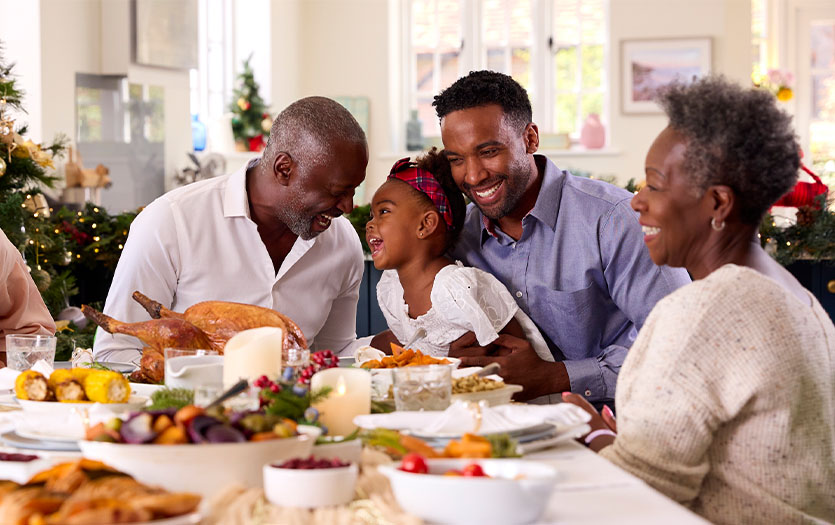
This post was written by Judy Tillapaugh, RDN, LD, CPT, dietitian, Parkview Behavioral Health Institute Eating Disorder Program.
Each fall my mom’s favorite festive questions were, “What would you like for Christmas?” and “What would you like me to make?” She and Dad so enjoyed giving gifts and sharing meals with family and friends. They saved throughout the year to purchase personal gifts, have tasty meals, and eat delicious desserts during the holidays. The holiday spirit was always rich in their thoughts and actions as they passed on their love and peace.
Yet, so many of the most meaningful family moments were priceless ones, that didn’t come wrapped in a box or on a colorful plate. What continues to be remembered and cherished are time spent making and decorating holiday cookies, Mom filling the home with fresh smells of baked bread, and Dad telling farm stories around the table.
This time of year can feel challenging as a variety of meal and snack stressors arise. You might feel a fear of possibly eating too much, shame from breaking a food rule, or guilt after eating something considered “junk” or “unhealthy.” It can feel overwhelming, leaving little room for the peace and love of the season.
This holiday season, consider planning to be present in a different way. Invite yourself to enjoy a satisfying, non-diet season by making intuitive, gentle nutrition choices. Consider it a gift to yourself that keeps on giving. Here are some pointers on how to use intuitive eating during the holidays and beyond.
The gifts of intuitive eating
Gift of no diet talk
- Request that no diets are used during the holidays.
- Ask that no one at home talks about diets including no weight checks, no diet foods, no calorie counting and no fitness trackers.
- Encourage family to come to meals with a discussion topic or a question to ask the group.
Gift of making peace with food
- Give yourself permission to have foods you like at meals and snacks. Denying yourself can lead to intense feelings of deprivation that could build to a craving.
- Make or order traditional or new holiday appetizes, entrees, sides and desserts.
Gift of challenging the food police
- Cancel labeling foods as either “good” or “bad” due to unrealistic, untrue, guilt-causing rules that likely started with dieting.
- Use positive self-talk when preparing and having meals to prevent negative bully thoughts.
Gift of discovering the satisfaction factor
- Create and have positive, supportive eating experiences without cell phones or other electronic devices. Consider instead having table decorations, background music and conversations.
- Eat mindfully, be present and notice pleasure from smells, tastes and textures.
Gift of coping with emotions with kindness
- Plan for a variety of foods that you and all your family members like. Involve everyone in the menu planning and preparation. Realize food restriction, both physically and emotionally, can prompt loss of control eating and extra emotions.
- Welcome all holiday feelings. Talk and/or write about excitement, joy, peace and other feelings. Use coping, calming ideas as needed to help with stressful feelings.
Gift of respecting your body
- Quit body checking, as it leads to body dissatisfaction. We all have our own special qualities. As you spend time with family, friends and co-workers, focus on qualities like their personality, skills, talents and kindness.
- Stop body-bashing self-talk and replace it with enhancing statements like, “My legs allow me to move,” “My creative thoughts help us do festive activities,” or “My listening ear will calm others.”
- Do nice things for yourself daily like taking deep breathes, using a meditation or inspirational app, taking a soothing bath or trying a new hair style.
Gift of positive movement
- Include festive, enjoyable activities before or after meals and snacks like singing and moving to holiday music, taking a walk or bike ride to view holiday lights, or playing with your children.
- Offer to do holiday home care (like the laundry and dishes), lawn care and/or decorating.
This holiday season, give yourself the gift of intuitive eating principles. You can learn more about intuitive eating at IntutiveEating.org.
Let us help
Our relationship with food can sometimes be difficult, irregular, with guilt and can lead to an eating disorder. If you have a sense that you or someone you know might be struggling with an eating disorder or disordered eating, the team at Parkview Behavioral Health Institute can help. Our specialized eating disorder program is designed to support individuals and families in their healing journey. Recovery really is possible. For an assessment, call 260-481-2700.




